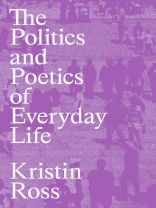The texts in this volume represent Kristin Ross’s attempt to think the question of the everyday across a range of discourses, practices and knowledges, from philosophy to history, from the visual arts to popular fiction, all the way to the forms taken by collective political action in the territorial struggles of today. If everyday life is, as many have come to believe, the ideal vantage point for an analysis of the social, it is also the crucial first step in its transformation.
The volume opens with a return to Henri Lefebvre’s powerful attempt to think the everyday as both residue and resource, as the site of profound alienation and-by the same token-the site where all emancipatory initiatives and desires begin. The second section focuses on our attempts to represent our lived reality to ourselves in cultural forms, from painting and literature and film to an analysis of the contemporary transformations of the sub-genre most embedded in the deep superficiality of everyday life: detective fiction. The final section turns to present-day ecological occupations in the wake of the zad at Notre-Dame-des-Landes, and locates the everyday as a site for rich oppositional resources and immanent social creativity.
Om författaren
Kristin Ross was born in State College, Pennsylvania in 1953. She attended the University of California at Santa Cruz and received a Ph D in French Literature from Yale in 1981. She is the author of a number of books on modern French politics and culture, all of which have been widely translated: The Emergence of Social Space: Rimbaud and the Paris Commune (Minnesota, 1988; Verso, 2008); Fast Cars, Clean Bodies: Decolonization and the Reordering of French Culture (MIT, 1995); May 68 and its Afterlives (Chicago, 2002), and Communal Luxury: The Political Imaginary of the Paris Commune (Verso, 2015). She has also translated works by Jacques Ranci�re and by the militant collective, Mauvaise Troupe. She lives in Stone Ridge, New York and Paris.












